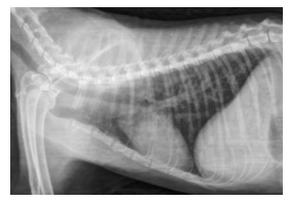Asthma is a recurrent respiratory condition caused by inflammation and narrowing of the airways. Symptoms include wheezing, airway spasms, coughing, exercise intolerance and open mouthed or labored breathing. Approximately one out of every 100 cats will develop asthma. Age of onset is typically between 2 and 8 years of age. Siamese and Himalayan cats have an increased prevalence of asthma.
Diagnosing asthma involves combining the history, physical exam findings, radiographic findings, and ruling out other common causes of cough in cats. Several other conditions that cause coughing in cats need to be ruled out before starting treatment for asthma. Depending on the severity and type of symptoms noted the following tests may be needed to make the final diagnosis.
- Thoracic radiographs/chest x rays – may show over inflated lungs or thickened/inflamed airways in cats with asthma. Radiographs also allow measurement of the heart and evaluation of blood vessels in the chest.
- Heartworm testing – mosquitos can spread heartworm to any cat, even those strictly indoors. Many cats with heartworm disease have similar symptoms to cats with asthma.
- ProBNP – A blood test is available that helps determine the stretch or stress on the heart muscle and can be helpful in distinguishing an asthmatic cough from a heart related cough.
- Parasite testing – some species of worms travel through the lungs during parts of their lifestages (ex: roundworms), other worms prefer to reside in the lungs (ex: lungworms). Stool testing can be performed to look for evidence of parasites.
- Medical work up –additional blood testing is available to check organ function and red and white blood cell counts. This may be needed to help determine if a cat is healthy in other regards, prior to starting medication to control asthma symptoms.
- Tracheal wash or bronchoalveolar lavage – advanced testing may be warranted in some cases. These tests allow for cells from the airways to be analyzed and allows infectious disease tests to be performed on the airway secretions.
Treatment is aimed at reducing inflammation of the airways.
Each asthmatic cat will require a treatment protocol that works best at controlling their symptoms while reducing long term side effects of the medications needed. The following are different therapies available for the treatment of asthma in cats. Some cats need only one medication, whereas others require a combination of drugs.
- Steroids –reduce inflammation of the airways. Side effects can include: increased thirst, increased urination, increased hunger, and long term use can sometimes cause elevated liver enzymes, diabetes or pancreatitis.
- Dewormer – may be given to treat for parasites as a component of cough
- Antibiotics – may be given to treat infection as a component of cough
- Bronchodialators – are administered to help open up the airways.
- Antihistamines- reduce allergic response in the airways.
- Cerenia – off label use of an oral anti-nausea drug for dogs. This medication has been found to be helpful in reducing inflammation of the airways with infrequent dosing and minimal side effects.
- Inhalers – can be used to help reduce inflammation and spasming of the airways. A specific dosing chamber is needed to help cats inhale the medication. See: https://www.trudellmed.com/animal-health/aerokat
Environmental control can be helpful in reducing asthma symptoms in cats.
Unscented dustless cat litter – such as Yesterday’s News or Dr. Elsey’s Precious Cat Ultra 99.9% dust free litter
- HEPA filters can reduce aerosolized allergens
- No smoking – second hand cigarette smoke can significantly increase asthma symptoms in cats
- No aerosol sprays, perfumed detergents, scented carpet cleaners or powders
- Use perfume free laundry detergent (ex: Tide Free or All Free n Clear)
Monitoring is needed to tailor treatments for each cat:
The goal is to use the right combination of therapies for each pet based on the severity and symptoms of their asthma. Repeat exams, radiographs and close communication between pet owner and veterinarian are needed to tailor the best asthma treatment. If at any time you are worried about your pets breathing, call our emergency number 608-592-3232.


